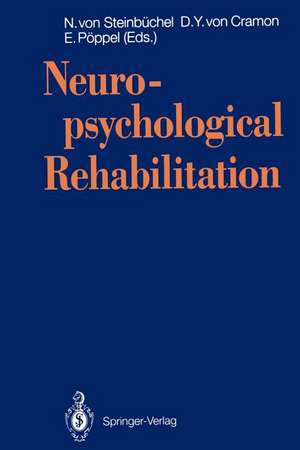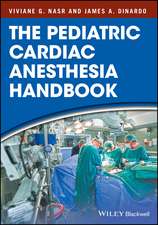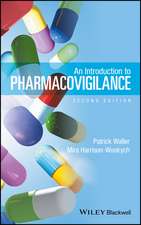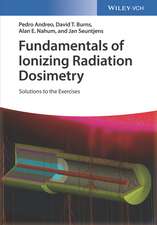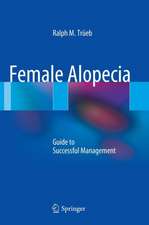Neuropsychological Rehabilitation
Editat de Nicole v. Steinbüchel, Detlev Y. v. Cramon, Ernst Pöppelen Limba Engleză Paperback – 6 aug 1992
Preț: 715.00 lei
Preț vechi: 752.63 lei
-5% Nou
Puncte Express: 1073
Preț estimativ în valută:
136.82€ • 143.14$ • 113.65£
136.82€ • 143.14$ • 113.65£
Carte tipărită la comandă
Livrare economică 02-16 aprilie
Preluare comenzi: 021 569.72.76
Specificații
ISBN-13: 9783540547693
ISBN-10: 354054769X
Pagini: 284
Ilustrații: XVI, 264 p. 7 illus.
Dimensiuni: 155 x 235 x 15 mm
Greutate: 0.4 kg
Ediția:1st ed. 1992. 2nd printing
Editura: Springer Berlin, Heidelberg
Colecția Springer
Locul publicării:Berlin, Heidelberg, Germany
ISBN-10: 354054769X
Pagini: 284
Ilustrații: XVI, 264 p. 7 illus.
Dimensiuni: 155 x 235 x 15 mm
Greutate: 0.4 kg
Ediția:1st ed. 1992. 2nd printing
Editura: Springer Berlin, Heidelberg
Colecția Springer
Locul publicării:Berlin, Heidelberg, Germany
Public țintă
Professional/practitionerCuprins
Basic Hypotheses.- Neuropsychological Rehabilitation from a Theoretical Point of View.- Cortical Representational Plasticity: Some Implications for the Bases of Recovery from Brain Damage.- Biological and Psychosocial Considerations in Recovery from Brain Damage.- Discussion: Environmental and Experiential Factors Play a Key Role in Determining the Outcome of Injury to the Central Nervous System.- Controversial Concepts of Rehabilitation.- A Neurobehavioural Approach to Brain Injury Rehabilitation.- Neuropsychological Rehabilitation and the Problem of Altered Self-Awareness.- Setting up a Neurorehabilitation Unit.- Discussion: Controversial Concepts of Rehabilitation.- Methodology.- Research Design in Neuropsychological Rehabilitation.- Evaluation of Neuropsychological Therapies: The Importance of Measurement.- Discussion: Evaluation in Constructing Neuropsychological Treatments.- Diagnostics.- Psychometric Evaluation of Neuropsychological Test Performances.- Assessment of Mild, Moderate, and Severe Head Injury.- The Amsterdam-Nijmegen Everyday Language Test (ANELT).- Discussion: Brain Damage and Rehabilitation: A Neuropsychological Approach.- Various Approaches for Treatment.- Early Treatment of Stroke in Man.- Minimising Brain Damage from Head Injury by Appropriate Early Management.- Cognitive Neuropsychology and Rehabilitation.- The Personal Level in Cognitive Rehabilitation.- A Family-System Approach to Brain Damage.- Discussion: Various Approaches for Treatment.- Specific Treatment of Specific Deficits.- Impairments of Attention in Brain-Damaged Patients.- Assessment and Management of Memory Problems.- The Influence of Cognitive Remediation Programme on Associated Behavioural Disturbances in Patients with Frontal Lobe Dysfunction.- Post-stroke Depression: Psychological and Biochemical Interactions.- Spontaneous Remission versus Rehabilitation of Aphasia.- Speech Disturbances of Organic and Functional Genesis and Their Therapy.- Therapy of Aphasia — Various Approaches in Comparison.- Discussion: Treatment of Specific Deficits.
